Index • FIDE 1948-1990 • Pre-FIDE • Highlights • Best games • News/Feedback • Gifts • Site map
1992 Fischer - Spassky Rematch
|
||
"Fischer is back! It's an event we have all eagerly awaited for 20 years..."
After disappearing from public view for 20 years, Robert James Fischer returned to play a chess match with Boris Spassky in 1992. At the time of the return match, Fischer was 49 years old. Spassky was 55, was ranked 101st in the world, and had a rating of 2560.
They came to the town of Sveti Stefan, a resort off the coast of Montenegro, 110 km from the civil war in Bosnia, 200 km from besieged Sarajevo. Fischer played despite United Nations sanctions against Yugoslavia and a warning from the United States Treasury Department, which threatened him with severe penalties for playing.
The prize fund was 5.000.000 US$, of which the first player to win 10 games would receive 3.650.000 US$. In the event of a 9-9 tie, Fischer would keep his title as "undefeated champion of the world". There would be no adjournments.
The match sponsor was Jezdimir Vasiljevic, President of Jugoskandic Bank, and a crony of Serbian president Slobodan Milosevic. The match arbiter was Lothar Schmid, who had performed the same function 20 years earlier in Iceland. Eugenio Torre, GM from the Philippines, served as Fischer's second, while Spassky had Borislav Ivkov as his second.
A memorable press conference
On 1 September 1992, Fischer gave his first press conference in 20 years. When asked about his reaction to the threats by Washington, Fischer took out a letter from the Treasury Department and spat on it.
He accused Kasparov and Karpov of playing "prearranged" matches, and accused Karpov and Korchnoi of the same. Spassky supported the opinion by pointing out the finish of the 19th game of the 1990 match in Lyon.
When asked about his reputation as an anti-Communist, Fischer said "Soviet Communism is basically a mask for Bolshevism which is a mask for Judaism." Asked later about his apparent anti-Semitism, he said, "I'm definitely not anti-Arab, OK?"
He accused the Soviets of keeping his royalties from his book "My 60 Memorable Games", and said that there would be no possibility of a match with Kasparov unless the royalties were paid.
On 2 September 1992, the New York Times published an editorial.
One chess fan summed up the reaction of the chess world in a letter to Chess Life, "Fischer is back! It's an event we have all eagerly awaited for 20 years. And now that he's back, I already wish he would go away again."Bosnia's Tragedy, and Bobby's Think of Bosnia overrun by Serbian-backed militias. Then think of the chess genius Bobby Fischer violating United Nations sanctions, and decency itself, to play a chess match for profit in Serbia against his old rival Boris Spassky.
The contrast reeks of callousness, not to mention disregard for international law. The match also violates President Bush's executive order forbidding Americans to do business in Yugoslavia.
The Yugoslav entrepreneur Jezdimir Vasiljevic is trying to recast the match as a charity event by pledging to donate $600,000 to refugee relief. This changes almost nothing. With its lucrative revenues from sponsor fees and television rights, and its purse of $5 million, the match is a business venture, pure and simple.
Mr. Fischer captivated chess enthusiasts and ordinary citizens everywhere when he defeated Mr. Spassky to become world champion 20 years ago. Today he embarrasses the world. Asked about a Federal ruling forbidding him to play, Mr. Fischer held up the notice and spat on it. If he plays, he deserves prosecution under the law. That could mean a $250,000 fine and 10 years in jail.
That would also be another sad episode in a strange career. Personal problems have long overshadowed Mr. Fischer's talents. He was stripped of the world title in 1975 because he declined to defend it. Eccentric and reclusive, he became a member of an extremist religious sect, then an ardent purveyor of anti-Semitic dogma. He hasn't played in public for two decades.
But eccentrics, too, are subject to the law. If Mr. Fischer plays, it is only right to make him pay.
The Fischer chess clock
The match was the first chess event to use the "Bobby Fischer chess clock". The clock had been patented by Fischer in the U.S. in 1989, but a working model had never been constructed. A clock was made for the event in a working time of five days.
The purpose of the clock was to ensure that a player always had at least one minute for the next move. Time scrambles, where a player had only seconds to reach the next time control, were thereby eliminated.
The terms of the match were that:-
- each player starts with 111 minutes on the clock
- after each move, 1 minute is added
- after move 40, 40 minutes are added
- after move 60, 30 minutes are added
- after move 80, 20 minutes are addedThis meant that each player had 150 minutes, or 2 1/2 hours, for the first 40 moves. This was a standard time control for world class chess events.
The first game was played at the Hotel Maestral on 2 September 1992.

|
| Game 1 : Fischer - Spassky |
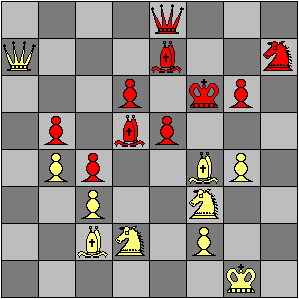
|
| after 39.Be3-f4(xP) |
|
|
| Game 2 : Spassky - Fischer |

|
| after 36...Rg8-f8 |
|
|
After the second game Fischer threatened to bar journalists and to turn off television monitors unless the event was reported as a "World Championship" match. The match organizers installed an overhead banner proclaiming "World Chess Championship", and the match continued.
| Game 4 : Spassky - Fischer |
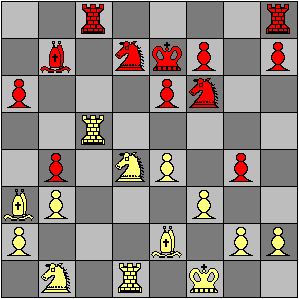
|
| after 20.Rc1-c5(xB) |
|
|
The 4th game was Fischer's first loss in 20 years. He said, "That's chess; one day you give a lesson, and the next day you get a lesson." He got another lesson in the 5th game, then gave lessons in the 7th, 8th, and 9th games.
| Game 9 : Fischer - Spassky |
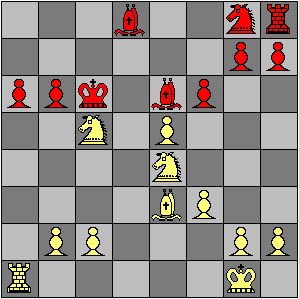
|
| after 19.Nb3-c5(xP) |
|
|
The match was scheduled to move to Belgrade after one of the players had won five games, half of the total required to win the match. Fischer scored his 5th full point in game 11.


|
| Game 11 : Fischer - Spassky |
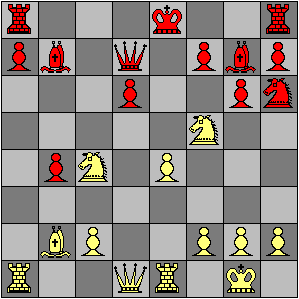
|
| after 15.Nd4-f5 |
|
|
Ten days later on 30 September, the match resumed in Belgrade at the Sava Business Center. Fischer had preferred Belgrade over Reykjavik in 1972.
The press room in the Sava Center was underused. As one photojournalist remarked, "Why would journalists want to come here? No photos, no interviews, what would they do?"
| Game 12 : Spassky - Fischer |
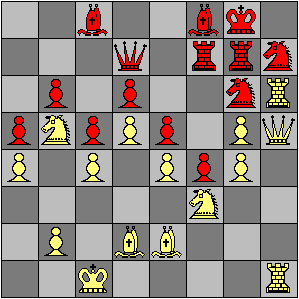
|
| after 31.Qh3-h5 |
|
|
During the 14th game on the 14th move, Fischer proposed a draw to Spassky, which Spassky accepted. Fischer reminded him that the match rules stipulated that if a game was agreed drawn less one hour after the start, the players must immediately begin another game, colors reversed.
Spassky, who was playing White, withdrew the agreement to draw, saying "But you'll kill me with White". Fischer later said, "The draw hadn't been finalized, because we didn't shake hands".
| Game 15 : Fischer - Spassky |
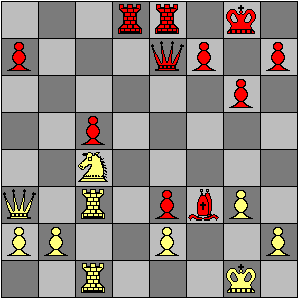
|
| after 23...Bd5-f3(xP) |
|
|
| Game 16 : Spassky - Fischer |
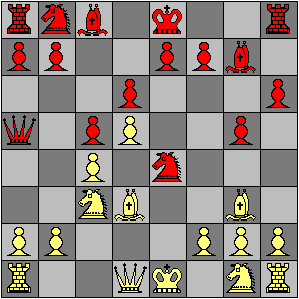
|
| after 9...Nf6-e4(xP) |
|
|
| Game 19 : Fischer - Spassky |
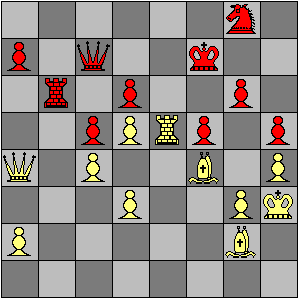
|
| after 30.Re2-e5(xB) |
|
|
| Game 30 : Spassky - Fischer |
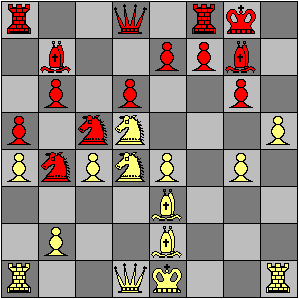
|
| after 17...Bc8-b7 |
|
|
|
WCC Index |
Results |
|
Previous |
Next |